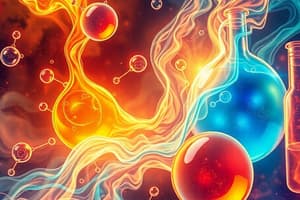Podcast
Questions and Answers
What is the primary focus of Organic Chemistry?
What is the primary focus of Organic Chemistry?
- Analysis of matter using various techniques
- Study of inorganic compounds without carbon
- Structure, properties, and reactions of carbon-containing compounds (correct)
- Examination of energy changes in reactions
Which type of isomerism involves different arrangements of atoms within a molecule?
Which type of isomerism involves different arrangements of atoms within a molecule?
- Structural isomerism (correct)
- Stereoisomerism
- Conformational isomerism
- Geometric isomerism
What defines a coordination compound in Inorganic Chemistry?
What defines a coordination compound in Inorganic Chemistry?
- A neutral compound with a pH of 7
- A compound containing only main group elements
- A complex formed by transition metals and ligands (correct)
- A compound formed by ionic bonds only
Which of the following best describes Gibbs free energy?
Which of the following best describes Gibbs free energy?
Which statement regarding the Brønsted-Lowry definition of acids and bases is correct?
Which statement regarding the Brønsted-Lowry definition of acids and bases is correct?
Which technique is primarily used in Quantitative Analysis?
Which technique is primarily used in Quantitative Analysis?
What is the main principle behind chemical equilibrium?
What is the main principle behind chemical equilibrium?
What are hydrocarbons primarily composed of?
What are hydrocarbons primarily composed of?
Flashcards are hidden until you start studying
Study Notes
Organic Chemistry
- Definition: Study of the structure, properties, composition, reactions, and synthesis of carbon-containing compounds.
- Key Concepts:
- Hydrocarbons: Compounds made of hydrogen and carbon; classified into alkanes, alkenes, and alkynes.
- Functional Groups: Specific groups of atoms that determine the characteristics and chemical reactivity of organic molecules (e.g., alcohols, ketones, carboxylic acids).
- Isomerism: Different compounds with the same molecular formula; includes structural and stereoisomers.
- Reactions:
- Addition reactions
- Substitution reactions
- Elimination reactions
- Rearrangement reactions
Inorganic Chemistry
- Definition: Study of inorganic compounds, typically those that do not contain carbon-hydrogen bonds.
- Key Concepts:
- Coordination Compounds: Complexes formed by transition metals and ligands; characterized by coordination numbers.
- Acids and Bases: Defines substances based on Proton (Brønsted-Lowry) or Electron pair (Lewis) transfer concepts.
- Salts: Formed from the neutralization of acids and bases; exhibit ionic properties.
- Main Group Elements vs Transition Metals: Distinctions in properties, reactivity, and compound formation.
Physical Chemistry
- Definition: Study of the physical principles underlying chemical systems and processes.
- Key Concepts:
- Thermodynamics: Examines energy changes during chemical reactions; includes laws of thermodynamics, enthalpy, and Gibbs free energy.
- Kinetics: Study of reaction rates and the factors affecting them; includes concepts like activation energy and catalysts.
- Quantum Chemistry: Examines the behavior of atoms and molecules in quantum mechanics; includes molecular orbital theory.
- Chemical Equilibrium: State where reactants and products' concentrations remain constant over time; characterized by the equilibrium constant.
Analytical Chemistry
- Definition: Study of the techniques and methodologies used to identify and quantify matter.
- Key Concepts:
- Qualitative Analysis: Determines the presence of chemical substances; often involves solubility tests and color reactions.
- Quantitative Analysis: Measures the amount or concentration of a substance; techniques include titration, gravimetry, and spectroscopy.
- Instrumentation: Involves the use of various instruments for analysis, such as:
- Chromatography (e.g., HPLC, GC)
- Mass Spectrometry
- NMR Spectroscopy
- UV-Vis Spectroscopy
- Applications: Used in pharmaceuticals, environmental monitoring, food safety, and forensic science.
Organic Chemistry
- The study of carbon-containing compounds, exploring their structure, properties, composition, reactions, and synthesis.
- Hydrocarbons: Compounds consisting solely of hydrogen and carbon, categorized into alkanes (single bonds), alkenes (double bonds), and alkynes (triple bonds).
- Functional Groups: Specific atom arrangements defining an organic molecule's properties and reactivity, including alcohols, ketones, and carboxylic acids.
- Isomerism: The occurrence of different compounds possessing the same molecular formula, encompassing structural isomers (different bonding arrangements) and stereoisomers (same bonding but different spatial arrangement).
- Reactions: Include addition (combining reactants), substitution (atom replacement), elimination (removing atoms), and rearrangement (reorganizing atoms).
Inorganic Chemistry
- Focuses on compounds typically lacking carbon-hydrogen bonds.
- Coordination Compounds: Complexes formed by transition metals and ligands, characterized by coordination numbers (number of bonds to the central metal).
- Acids and Bases: Defined by proton transfer (Brønsted-Lowry) or electron pair donation (Lewis).
- Salts: Products of acid-base neutralization, exhibiting ionic properties.
- Main Group Elements vs Transition Metals: Distinction arises in their properties, reactivity, and compound formation.
Physical Chemistry
- Investigates the physical principles underlying chemical systems and processes.
- Thermodynamics: Analyzes energy changes during reactions, encompassing the laws of thermodynamics, enthalpy (heat change), and Gibbs free energy (spontaneity).
- Kinetics: Studies reaction rates and factors influencing them, including activation energy (energy required for reaction) and catalysts (speeding up reactions).
- Quantum Chemistry: Examines atomic and molecular behavior within quantum mechanics, including molecular orbital theory (describing electron distribution).
- Chemical Equilibrium: A state where reactant and product concentrations remain constant, characterized by the equilibrium constant (ratio of products to reactants).
Analytical Chemistry
- Employs techniques and methodologies for identifying and quantifying matter.
- Qualitative Analysis: Determines the presence of substances, using methods like solubility tests and color reactions.
- Quantitative Analysis: Measures the amount or concentration, employing techniques such as titration (reactant volume determination), gravimetry (mass measurement), and spectroscopy (light interaction with matter).
- Instrumentation: Uses various instruments for analysis, including:
- Chromatography (separating substances based on properties): HPLC (high-performance liquid chromatography), GC (gas chromatography)
- Mass Spectrometry (determining molecular weight)
- NMR Spectroscopy (analyzing atomic nuclei)
- UV-Vis Spectroscopy (measuring light absorption at specific wavelengths)
- Applications: Found in pharmaceuticals, environmental monitoring, food safety, and forensic science.
Studying That Suits You
Use AI to generate personalized quizzes and flashcards to suit your learning preferences.




